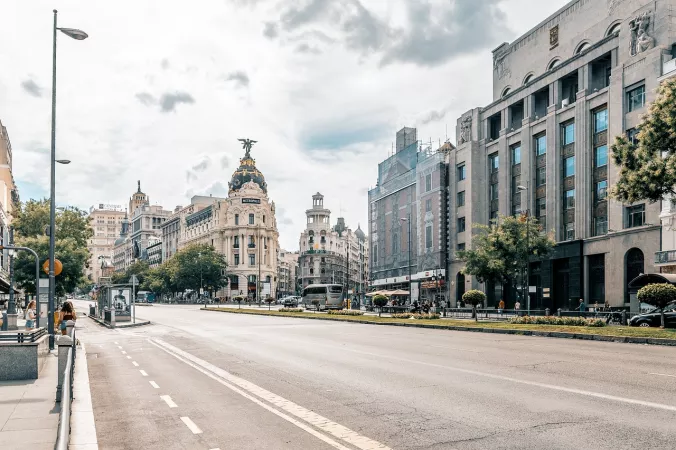Majorca Travel Guide
Majorca, the largest island in the Balearic archipelago of Spain, is renowned for its stunning beaches, crystal-clear waters, and vibrant nightlife. Its rich history dates back to ancient times, with influences from the Romans, Moors, and Spanish. Majorca's diverse landscape includes mountains, olive groves, and picturesque villages, making it a popular destination for tourists seeking both relaxation and adventure.Top Attractions in Majorca
- Palma Cathedral
- Serra de Tramuntana
- Valldemossa
- Cap de Formentor
- Caves of Drach
Majorca is Famous for
Boasting stunning beaches and a vibrant nightlife, Majorca is famous for its picturesque coastline and historical sites.Top Attractions in Majorca
- Palma Cathedral
- Serra de Tramuntana
- Valldemossa
- Cap de Formentor
- Caves of Drach
What's Great about Travelling to Majorca?
- Beautiful beaches
- Rich history and culture
- Great nightlife
What's Not So Great about Travelling to Majorca?
- Can be crowded during peak tourist season
- Some areas may be overly touristy
- Language barrier for non-Spanish speakers
Travel Tips for Majorca
- Check visa requirements before traveling
- Renting a car is recommended for exploring the island
- Stay hydrated and wear sunscreen during the hot summer months
Important Majorca trip information
- Ideal Duration: 1-2 weeks
- Best Time to Visit: May to September
- Nearby Airports and Railway Stations: Palma de Mallorca Airport and Palma Intermodal Station
Top 12 Places to visit in Majorca
FAQ's on Majorca
Q1: What is the best time to visit Majorca?
The best time to visit Majorca is during the spring (April to June) and fall (September to October) when the weather is pleasant, and the tourist crowds are fewer. Summer (July to August) is the peak season with hot temperatures and crowded beaches, while winter (November to March) is quieter but cooler. Consider visiting during the shoulder seasons for a more enjoyable experience with moderate weather and various events happening across the island.
Q2: Do I need a visa to travel to Majorca?
As part of Spain, Majorca follows the Schengen Agreement, allowing many nationalities to enter visa-free for up to 90 days within a 180-day period for tourism or business purposes. However, it's essential to check specific visa requirements based on your nationality and planned duration of stay. Make sure your passport is valid for at least three months beyond your intended departure date.
Q3: What are the must-visit attractions in Majorca?
Majorca boasts a range of attractions, including the historic Palma Cathedral, the scenic Serra de Tramuntana mountains, charming villages like Valldemossa and Deià, the stunning beaches of Cala Varques and Es Trenc, and the fascinating Cuevas del Drach (Dragon Caves). Don't miss exploring the local markets, trying traditional cuisine, and indulging in water sports along the coast.
Q4: Is Majorca a safe place to travel?
Majorca is generally a safe destination for tourists. However, like any other place, it's essential to be cautious of pickpocketing in crowded areas and beaches. Avoid leaving valuables unattended and stay vigilant in tourist hotspots. Emergency services are accessible by dialing 112. It's advisable to be aware of your surroundings, especially at night, and follow basic safety precautions.
Q5: What is the local currency in Majorca and can I use credit cards?
The local currency in Majorca, like the rest of Spain, is the Euro (€). ATMs are widely available in cities and towns, accepting major credit and debit cards. Most establishments like hotels, restaurants, and shops also accept credit cards. However, it's recommended to carry some cash for smaller purchases and in case you visit more remote areas with limited card payment facilities.
Q6: What is the local cuisine like in Majorca?
Majorcan cuisine is a delightful mix of Mediterranean flavors, featuring fresh seafood, traditional dishes like sobrassada (sausage), tumbet (vegetable dish), and ensaïmada (sweet pastry). Don't miss trying the local wines, olive oils, and almond-based desserts. Vegetarian and vegan options are available in most restaurants, catering to various dietary preferences. Embrace the culinary delights of Majorca during your visit.
Q7: What transportation options are available in Majorca?
Majorca offers diverse transportation options, including buses connecting major towns and resorts, a reliable train network running between Palma and Sóller, taxi services, car rentals for exploring the island at your own pace, and bike rentals for eco-friendly travel. Renting a car is a popular choice for exploring remote areas and hidden gems, while public transport is convenient for getting around the main tourist spots.
Q8: Are there any cultural norms or etiquette I should be aware of when visiting Majorca?
When visiting Majorca, respect local customs like greeting with a handshake or kiss on the cheek, dressing modestly when visiting churches or religious sites, and avoiding loud behavior in public places. Tipping around 5-10% in restaurants is appreciated. During festivals or religious events, be mindful of local traditions and participate respectfully. Learning a few basic Spanish phrases can also enhance your interactions with the locals and show appreciation for their culture. Enjoy your trip to Majorca while embracing its unique customs and etiquette.
Q9: I am a travel agent. How can I buy travel leads of Majorca?
Register yourself as a travel agent at agents.tripclap.com and then you can buy travel leads to Majorca once your account is approved. For more details contact our support team at +91-8069186564 or support@tripclap.com

